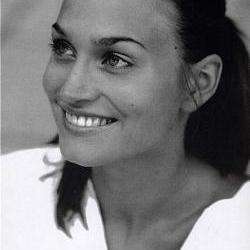My mother always told me not to sit too close in the theatre, and after seeing this revival of Martin Kusej’s modern realization of Stravinksy’s The Rake’s Progress at the Theater an der Wien, I think I know what she was talking about.
Act I begins innocuously enough in a sparse apartment, unfurnished apart from a mattress and a television. The floor is littered with pizza boxes and beer cans, and Anne Trulove (Anna Prohaska) and her mullet-coiffed boyfriend Tom Rakewell (Toby Spence) are smoking, watching TV and hanging out. Nick Shadow (Bo Skovhus)’s entrance is made through the floor of an empty “Pizza Diavolo” box. Shadow, in a black suit and slicked-back hair in a ponytail, presents Tom with a cash-filled black briefcase seconds after Tom wishes for wealth. In an interesting directorial twist, the briefcase clearly comes between Tom and Anne as he protectively holds it to his chest. Scene II is where things get (literally) hairy. Nude, very brave extras perform various and graphic sex acts on each other on plastic-wrapped couches while Shadow films the orgy. Anne Trulove later sings her famous “No word from Tom... I go to him” into a video camera in the now-deserted apartment.
Act II continues the theme of media and modern-day depravity/celebrity. Tom’s new penthouse features a plasma flat-screen, and the beer cans have been replaced by champagne bottles. Nick plies Tom with cocaine, and Tom sings the opening scene crawling across the floor, complaining of boredom and wishing for happiness. Nick flips the channel to a celebrity tabloid show broadcasting scandalous scenes of Baba the Turk (Anne Sofie von Otter), a flamboyant transvestite in purple satin with an Annie Lennox hairstyle. When Nick encourages Tom to marry Baba, Tom asks if he’s gone mad and jumps into the (real) pool outside. Shadow sings “I was never saner” as he drags Tom out of the pool, undresses and dries him. Tom does marry Baba, and Anne learns of their marriage when she sees television coverage of the event. Baba soon so irritates Tom with her incessant talking (“As I was saying, both brothers wore moustaches”) that he strangles her. Then, in a drug-induced delirium, he wishes to turn stone into bread while evangelical TV programming plays in the background. Nick presents him with the “machine” – a cardboard box. They pack the unconscious Baba in the box and the curtain falls.
Act III opens on the gaudy auctioneer Sellem (Gerhard Siegel) in a green suit and purple tie selling off Tom’s belongings in a paparazzi-ridden auction as the choir sings “ruin, disaster, shame”. The boxes include fish, sculptures of Roman heads, images of Tom, and finally, Baba who – reanimated – takes her leave after punching out Sellem and singing a duet with Anne. Anne decides to become a pop star. Shadow reveals his true nature in the next scene, and even though Tom finally wins back his soul in a game of chance, Shadow maliciously addles his brain. The scene ends with a clearly insane Tom slowly turning a Swiss army knife in his bloodied hands. In the final scene Tom, who now thinks he is Adonis, is visited by the now-famous Anne. Rolling her eyes, she sarcastically sings Tom to sleep, scenes of her pop career concurrently playing on the omnipresent TV, and then deserts him. The epilogue features a sole television on stage broadcasting a pre-recorded scene of all major cast members in street clothes in a talk-show setting.
The production, a mixed bag, drove home the reality-television/empty celebrity theme a bit insistently, and though there were some brilliantly innovative moments, robbing Anne of her one defining characteristic (her love and devotion to Tom) did not work at all. It was also not a particularly singer-friendly approach to staging. Shadow had to sing from inside a massive hole at one point, and both Tom and Anne were forced to sing prostrate, which not only made their lives difficult, but highlighted their heavy dependence on the conductor.
Musically speaking, the smaller roles outshone the larger. Bo Skovhus was a brilliant, dastardly Shadow who played Tom’s servant but was clearly always his master. Likewise Anne Sofie von Otter who, though hardly on stage for more than a half-hour, completely stole the show in terms of vocal prowess and charisma from the female lead. Both leads sung competently, but neither were particularly strong or memorable vocally, and neither acted with conviction. One had the feeling that Prohaska only came through the orchestra thanks to the admirable efforts of conductor Michael Boder, who was excellent, as was the ORF Radio-Symphonieorchester Wien which he led. The Arnold Schoenberg Chor was also in wonderful form and in many cases employed clearer diction than the soloists, and both Carole Wilson (Mother Goose) and Gerhard Siegel (Sellem) made strong, albeit brief, appearances.


